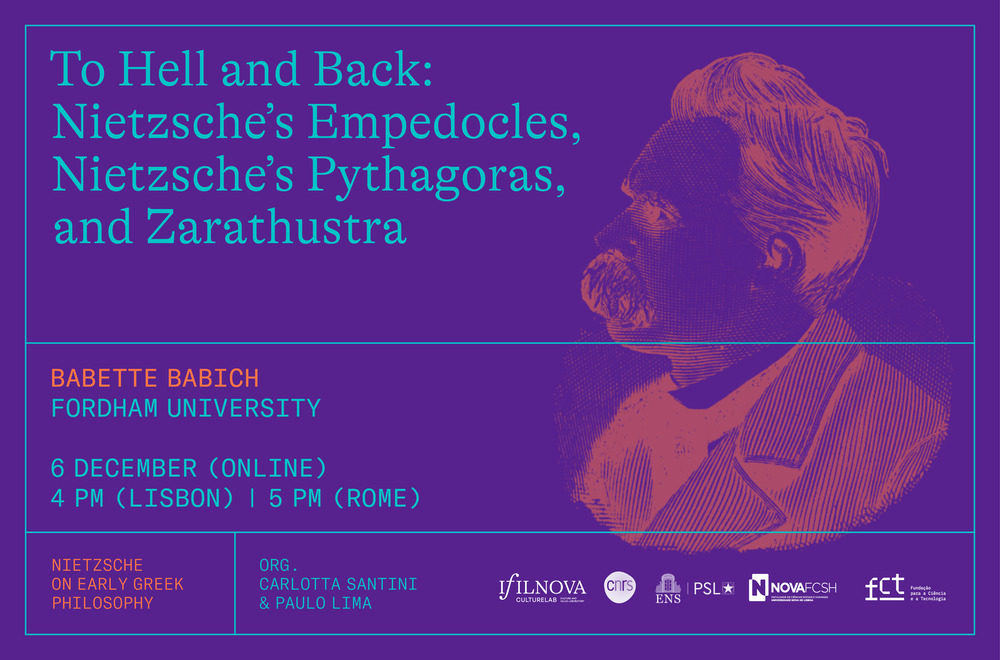Babette Babich

6 December | 4 PM (Lisbon)
5 PM (Rome) | for other locations click here.
Abstract
Singular, perhaps, among the many things we are told that Empedocles taught his followers would be the gnomic instruction ἄξεις δ’ ἐξ ’Αίδαο καταφθιμένου μένος ἀνδρος. (DK 111), translating Diels herewith: ‘you will lead back from Hades, the force [Kraft] of a dead man.’ The theme of this lecture is a return journey to the underworld, reading Nietzsche’s Empedocles with Lucian’s Κατάπλους ἣ Τύραννος [Kataplous/Hadesfahrt/Downward Journey] from which Nietzsche takes (as Goethe likewise takes) the formula for the supposed ‘superman’, that is, today, the pop conception of the transhuman: the Übermensch, overhuman [ὑπεράνθρωπός], and which Lucian articulates in a satiric or parodic context. The focus is Nietzsche’s writings as philologist in the tradition of classical philology, in particular his Basel lectures on Empedocles in addition to Heraclitus and Pythagoras (and the Pythagoreans). In the shared context of philosophy and the Orphic mystery tradition, at issue is the ancient Greek concept of the underworld and the fate of the soul, including the shamanic tradition invoked by a broad range of scholars associated with Pythagoras and Empedocles, including Karl Reinhardt, F.M. Cornford, and, later, Walter Burkert and Peter Kingsley, in addition to more recent authors who have written on the Derveni papyrus.
Babette Babich (Fordham University)
Nietzsche On Early Greek Philosophy | Online Seminar
Org. Paulo Lima (Lisbon Nietzsche Group/Research Group on Ancient Philosophy/IFILNOVA) and Carlotta Santini (CNRS/ENS, Paris)
The seminar seeks to explore the dialogue between Nietzsche and early Greek philosophy during the period when he was Professor of Philology at the University of Basel. This is a subject that has not been studied in a systematic way, although there are some decisive contributions showing its importance for understanding Nietzsche’s philological and philosophical thinking. Our purpose is to provide a platform on which contributions from specialists in Nietzsche and ancient philosophy can be presented, debated, and complemented to fill this gap in Nietzschean studies. Key topics of the sessions will be Nietzsche’s activity as a scholar of ancient doxography on early Greek philosophy, his general conception of what he called the “pre-Platonic philosophers”, as well as his interpretation of some of these philosophers. The body of texts to be studied during the sessions includes not only the published ones, but also Nietzsche’s lectures, notebooks, and correspondence. The seminar is part of the activities of the Lisbon Nietzsche Group and the Research Group on Ancient Philosophy (CultureLab/IFILNOVA). It is the result of a collaboration between IFILNOVA, the Centre Nationale de Recherche Scientifique, and the École Normale Supérieure (Paris). It will take place monthly starting from October 2023 and will have nine sessions. It will be open to all interested parties, who will be able to register for each session by contacting the organizers (plima@fcsh.unl.pt, carlottasantini@hotmail.it). For more details, please see the programme below.
Next sessions
Session 4
24 January, 4 PM (Lisbon) | 5 PM (Rome) | for other locations click here.
Matthew Meyer (University of Scranton), “The Unity of Opposites: A Fundamental Principle in Antiquity and Today”
Session 5
28 February, 4 PM (Lisbon) | 5 PM (Rome) | for other locations click here.
Helmut Heit (Klassik Stiftung Weimar), “Nietzsche and Protagoras”
Session 6
27 March, 4 PM (Lisbon) | 5 PM (Rome) | for other locations click here.
Yannick Souladié (ENS, Paris), “The ‘Tremendous Leap of Anaximander’: Nietzsche’s New Understanding of the Apeiron”
Session 7
8 May, 4 PM (Lisbon) | 5 PM (Rome) | for other locations click here.
André Laks (Universidad Panamericana, México/Sorbonne Université, Paris): “Nietzsche doxographus”
Session 8
5 June, 4 PM (Lisbon) | 5 PM (Rome) | for other locations click here.
Daniel Conway (Texas A&M University), “How Socrates Became What he Was: The Evolution of a Diagnosis”
Session 9
19 June, 4 PM (Lisbon) | 5 PM (Rome) | for other locations click here.
Anne Merker (Université de Strasbourg), “Nietzsche, Heraclitus, and Polemos”
Event supported by the Foundation for Science and Technology (Fundação para a Ciência e para a Tecnologia) of the Portuguese Ministry of Education and Science under the projects UIDB/00183/2020 and UIDP/00183/2020.

